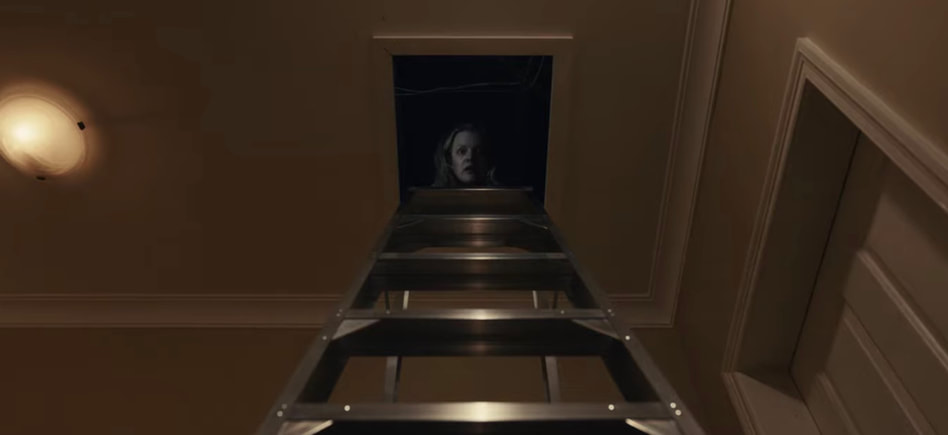In commenting on the present day, The Invisible Man not only has an immediately recognizable antagonist in Griffin but a sadly recognizable antagonist in Moss’ Cecilia as well. In her description, Griffin views her as one more asset in his portfolio and if a tranch of stocks can’t leave without his permission, neither can she. The film makes a connection between the ravenous consumption of a rich man and denies that the same man would be able to turn it off in different areas of his life, like one socially acceptable/desirable flaw will inevitably lead to an unacceptable sickness. As the target of his wrath, Cecilia goes through a physical and psychological wringer, fending off the big reveal with her body and given the impossible task of convincing others that it exists at all. Horror as an exaggerated outlet of some sociological phenomenon is a long custom of the genre, and Whannell palpably contributes to it with this film.
Even without that added layer, The Invisible Man works on a visceral level. Everyone’s looked behind them when no one was there or got up at night to investigate a creaking house, and the film lives in the space between the possibility that there’s something there and the realization that there isn’t. The relief and slight shame for suspecting in the first place that accompanies those real-life moments, however, is not provided here. There’s a flee-the-theater quality to The Invisible Man, like the tension is too heavy to withstand if the whole movie is going to be a pseudo-home invasion terrifier. Thankfully for this viewer and his deep discomfort with home invasion thoughts, the film shifts to a different but no less unsettling horror subgenre. Both halves of the film, accentuated by Benjamin Wallfisch’s discordant score, are filled with the kind of negative space that is usually filled by this or that monster in most horror movies, but here, thanks to the central conceit, the space is left empty (or is it). In these scenes, Whannell doesn’t cheapen the film with easy tells suggesting that the villain is or isn’t in the frame, a level of restraint that adds to the unsettling nature and keeps it unpredictable.
Moss’s work on TV and film over the last thirteen years has been continuously dynamic and memorable, and her intensity is well-suited for her role as Cecilia. She’s in a pulpy film and she accordingly plays it big, but there’s the sense that she could’ve gone even bigger. Her holding something back gives her room to flirt with the edge of sanity, and after Handmaid’s Tale and Her Smell, Moss is in her wheelhouse when putting forth visible effort in trying to keep herself together. There’s also an actorly challenge for Moss that she, or at least her stunt double, tackles, wherein Cecilia frequently has to tussle with an invisible assailant. Whether through mimery or special effects, it’s an impressive feat. Jackson-Cohen’s way of carrying himself informs so much about his character. The elemental dislike of Adrian is partly due to Whannell’s drilled-down writing of the character, and Jackson-Cohen brings those repulsive traits to life. Michael Dorman plays Adrian’s brother and lawyer, a difficult character whose motivations are constantly in question. Hodge, along with Storm Reid as his daughter, is ill-served by the script in the film’s one major weakness. The film needs to sever the relationship between Cecilia and the Laniers, and it goes about doing so in an unbelievable way that makes their characters into dupes in what is otherwise a believable story.
By tapping into several contemporary threads, Whannell crafts a well-made thriller more resonant that it needed to be and pushes his film into the ‘elevated’ horror tier, a classification disliked by adherents of the broader genre. That’s a loaded category but when a filmmaker can capitalize on the primal nature of horror, as Whannell does, while also putting a name and face to something that’s often abstracted or denuded in the media, another term is necessary to distinguish the Insidiouses of the world from works like this one. B+

 RSS Feed
RSS Feed